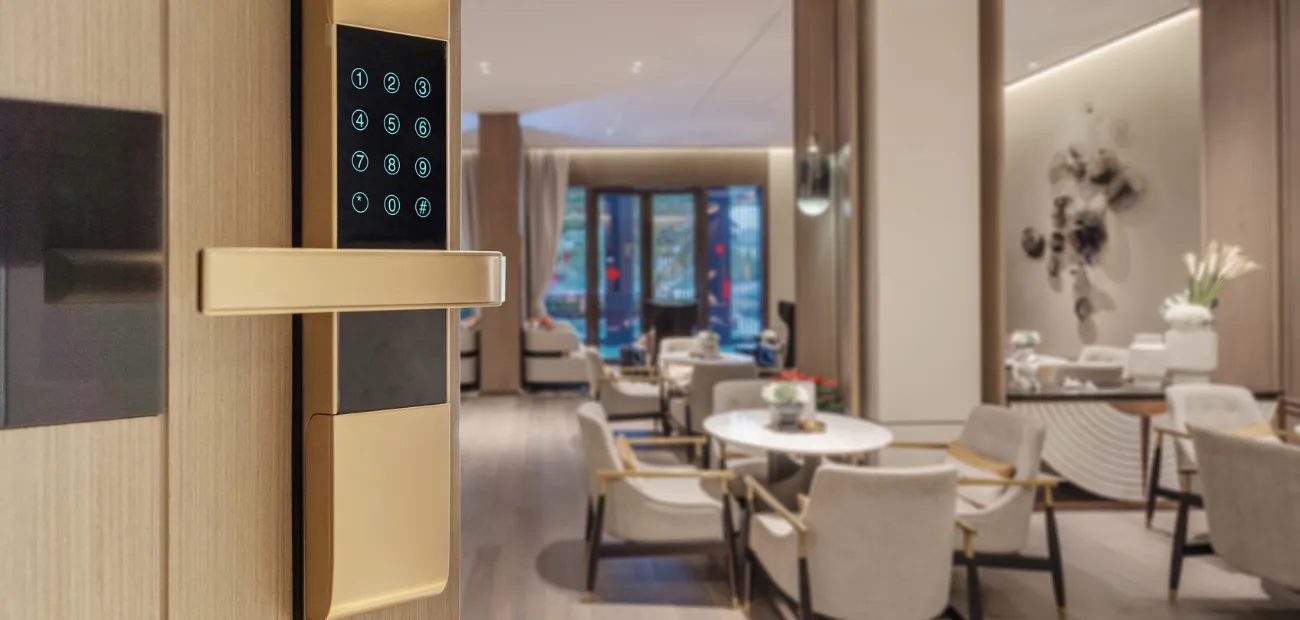The hospitality industry is constantly seeking ways to enhance guest experience, improve operational efficiency, and elevate security measures. In recent years, smart lock technology has emerged as a game-changer, revolutionizing the way hotels manage guest access and security. This article explores the key components of a smart lock solution tailored for hotels, including the unique characteristics of the hotel environment, specific requirements for hotel applications, essential considerations for selecting the right solution, system architecture, and our recommended smart lock product.

1. Characteristics of the Hotel Environment:
Hotels see a high volume of guests coming and going, requiring efficient and secure access control systems. Some key characteristics of the hotel environment include:
a) High guest turnover: Hotels accommodate different guests on a daily basis, necessitating a quick and seamless check-in and check-out experience.
b) Multiple access points: Hotels typically have various entry points requiring access control, including guest rooms, entrances, elevators, and common areas.
c) Staff access management: Hotel staff requires different levels of access to restricted areas, such as administrative offices, back-of-house, and storage areas.
d) Privacy and security: Maintaining guest privacy while ensuring the highest level of security is of utmost importance in the hotel industry.
2. Specific Requirements for Hotel Applications:
Smart lock solutions for hotels must meet several specific requirements to address the unique needs of the hospitality industry, such as:
a) Integration with hotel management systems: Seamless integration with the hotel's property management system (PMS) allows for efficient guest check-in and check-out, real-time room status updates, and guest data management.
b) Mobile key capabilities: The ability to provide guests with mobile keys via smartphone applications offers convenience and eliminates the need for physical key cards.
c) Guest control and personalization: Customizable access privileges, such as restricting access to specific areas or granting temporary access for housekeeping or maintenance, provide flexibility and personalization.
d) Audit trail and reporting: A robust audit trail feature allows hotel management to monitor access activities, track guest movements, and generate reports for security and compliance purposes.
e) Durability and reliability: Smart locks should be built to withstand frequent usage, harsh environmental conditions, and potential tampering attempts.
3. Essential Considerations for Selecting the Right Solution:
When choosing a smart lock solution for hotels, several factors should be taken into account:
a) Compatibility: The solution should be compatible with the hotel's existing infrastructure, including door types, locking mechanisms, and communication protocols.
b) Scalability: It should have the flexibility to accommodate the size and future growth of the hotel, allowing for easy integration with additional locks or expanding the system to cover new areas.
c) Security standards: The solution should adhere to industry security standards, such as encryption protocols, to ensure the highest level of protection against unauthorized access.
d) User-friendly interface: An intuitive user interface, both for hotel staff and guests, enables easy operation and ensures a smooth user experience.
e) Vendor reputation and support: It is essential to select a reputable vendor with a track record of providing reliable products and responsive customer support.
4. System Architecture:
A smart lock system for hotels typically consists of the following components:
a) Smart locks: These are installed on guest room doors and other access points, allowing keyless entry via various authentication methods, including NFC, Bluetooth, RFID, or mobile apps.
b) Management software: The software integrates with the hotel's PMS, enabling seamless synchronization of guest data, room assignments, and access privileges.
c) Communication infrastructure: The system relies on a stable and secure communication network, such as Wi-Fi or Zigbee, to facilitate real-time monitoring and control.
d) Mobile applications: Guest-facing mobile apps with mobile key capabilities allow guests to check-in, access their rooms, and manage their stay via their smartphones.
e) Administrative dashboard: A centralized administration console provides hotel staff with comprehensive control over access management, monitoring of door statuses, and generating access reports.
5. Our Product Recommendation:
After careful consideration of the unique requirements of the hotel industry, we recommend our XYZ Smart Lock System. Our solution offers seamless integration with your existing PMS, mobile key capabilities, robust security features, and a user-friendly interface. It provides a scalable and reliable solution to meet your hotel's access control needs while ensuring enhanced guest experience and operational efficiency.
Smart lock systems tailored for hotels offer numerous benefits, including improved guest experience, enhanced security, and streamlined operations. By understanding the characteristics of the hotel environment, specific requirements for hotel applications, essential considerations for selecting the right solution, system architecture, and our product recommendation, hotels can make informed decisions and implement smart lock solutions that meet their unique needs and ultimately elevate the guest experience.

